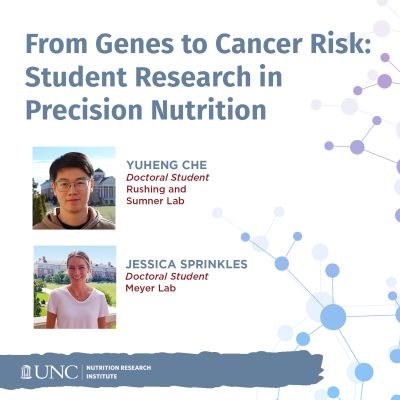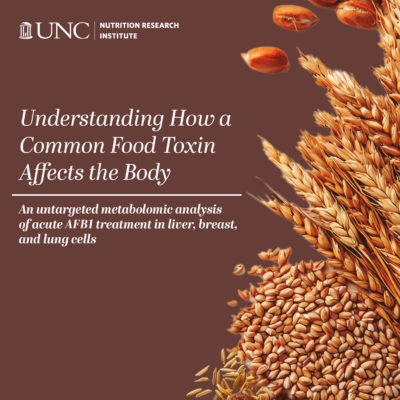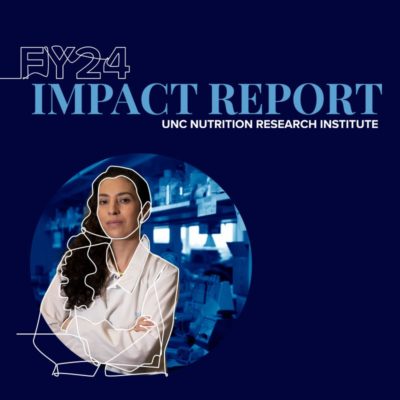Susan Sumner, PhD
Professor of Nutrition and Pharmacology
Susan Sumner, PhD is a Professor of Nutrition at UNC Chapel Hill’s Nutrition Research Institute (NRI), and the Director of the Metabolomics and Exposome Laboratory (MEL) at UNC Chapel Hill. Dr. Sumner is working to make personalized medicine and precision nutrition a reality. Using state-of-the-art metabolomics and exposome technologies, Dr. Sumner’s team determines how molecules that are present in our tissues and biological fluids are associated with states of health and wellness. Through this approach, biomarkers are discovered that can lead to new diagnostics for the early detection and diagnosis of disease, to monitor treatment and intervention, and to inform the development of intervention strategies.
The Sumner-Lab uses analytical methods to detect tens of thousands of signals for molecules that are present in biological specimens (such as urine, serum, plasma, feces, sweat, tissues, and cells).Using untargeted metabolomics/exposome analysis, signals are detected for metabolites that are derived from endogenous metabolic process, such as neurotransmitters, hormones and steroids, sugars, amino acids, purines and pyrimidines, lipids, fatty acids, and vitamins and essential nutrients. Signals are also detected for metabolites derived from a wide range of exposures, including metabolites derived from ingestion of foods, intake of medications or drugs of abuse, and environmentally relevant chemicals.
Show MoreSumner’s Team
BSPH Students
The North Carolina Human Health Exposure Analysis Resource Hub (NC HHEAR Hub)
Metabolomics and Exposome Laboratory (MEL) for the following NIH Centers
Nutritional Pharmacology/Toxicology
Choline and Related Metabolites in Nutrition Research
Metabolomics: Using In Vitro Models to Reveal Mechanisms of Cellular Response
700 MHz NMR Spectroscopy Services on the North Carolina Research Campus
Quantitative Targeted Analysis of Host Metabolism - Biocrates
Recent Grants
R01CA282657 (Rushing, PI, UNC-CH): 2024 – 2029
NIH/NCI
The Human Cancer Metabolome Atlas
1U24CA268153-02S (Sumner, PI, UNC-CH):2023 – 2025
NCI/NIH Common Fund
Nutrition for Precision Health: Targeted Metabolomics, Phytochemicals, and Clinical Assays
1U24CA268153 (Sumner, PI, UNC-CH): 2022 – 2027
NCI/NIH Common Fund
Metabolomics and Clinical Assays Center (MCAC) for the Nutrition for the Precision Health Study
1R01DK126666-01 (Sumner, MPI, UNC-CH):2021 – 2026
NIDDK
Mechanistic and metabolic underpinnings of ALDH1L1 polymorphisms in the regulation of glycine metabolism
1U2CES030857 (Sumner, MPI, UNC-CH):2019 – 2026
NIEHS
Human Health Exposure Analysis Resource (HHEAR) Hub and Environmental Influences on Childhood Outcomes (ECHO)
U01OH011300-05 (Nolan, PI, NYUSOM): 2017 – 06/30/2026
NIOSH
Title: Metabolomics of World Trade Center-Lung Injury
R01HL143885 (Sumner, MPI, UNC-CH): 2019–2023
NHLBI
Leveraging multi-omics approaches to examine metabolic challenges of obesity in relation to cardiovascular diseases.
1U01CA235507 (Du, PI, UNC-Charlotte): 2018–2022
NCI
Cross-Platform and Graphical Software Tool for Adaptive LC/MS and GC/MS Metabolomics Data Preprocessing
1R37CA226969-01 (Bae-Jump, PI, UNC-CH): 2018–2023
NCI
Obesity-driven Metabolic and Molecular Biomarkers of Metformin Response in Endometrial Cancer
1R21CA235029-01 (Smith-Ryan & Bae-Jump, MPI, UNC Chapel Hill): 2019–2020
NCI
Interval Exercise Training as a Therapy for Endometrial Cancer
1U01OH011300-01A1 (Nolan, PI, NYUSOM): 2017– 2023
NIOSH
Metabolomics of World Trade Center-Lung Injury
1R01DK115380-01 (Zeisel, PI, UNC Chapel Hill): 2017- 2021
NIDDK
Developing a Biomarker Panel to Assess Choline Nutritional Status
U01ES027254 (Sumner, MPI, UNC Chapel Hill): 2016–2021
National Institute of Environmental Health Sciences
Early-life END exposure and the impact on neurobehavioral, cardiovascular, and biochemical mechanisms.
5UG3OD023275 (Karagas, PI, Dartmouth College): 2016-2023
National Institute of Environmental Health Sciences
Environmental Influences of Child Health Outcomes (ECHO) Pediatrics Cohort
New Hampshire Birth Cohort
5UG3OD023305 (Trasande, PI, NYU School of Medicine): 2016-2023
National Institute of Environmental Health Sciences
Environmental Influences of Child Health Outcomes (ECHO) Pediatrics Cohort
NYU Pediatric Obesity, Metabolism and Kidney Cohort Center
R01DK110077 (Smoyer, PI, Nationwide Children’s Hospital) 2017-2022
NIDDK
Integrating Proteomics and Metabolomics to Understand Pediatric Glomerular Disease
1R21HD087878-01A1 (Harville, PI, Tulane): 2017-2019
NICHD
Preterm birth, pre-eclampsia, and the exposome
In the News
From Genes to Cancer Risk: Student Research in Precision Nutrition
Graduate students at the NRI are uncovering how genetics and multi-omics can transform nutrition into a more precise, preventive, and personal science.
Understanding How a Common Food Toxin Affects the Body
Susan Sumner, PhD, featured in The Boston Globe article on Living a Longer, Healthier Life
Discover the NRI’s Impact: FY24 Report
NRI Researchers Secure New NIH R01 Grants for Critical Nutrition Research
Blake Rushing, PhD, Awarded Grant to Develop Human Cancer Metabolome Atlas
Q & A with Grace Fu
Impact Report FY23
Publications
2025
Non-redundant roles for paralogous proteins in the yeast glucose-sensing pathway
Association of metabolomics measurements with blood cell phenotypes
Multi-omics signature of healthy versus unhealthy lifestyles reveals associations with diseases
Defining subgroups of pediatric nephrotic patients with urine proteomics
Advancing translational exposomics: bridging genome, exposome and personalized medicine
Impact of prenatal phthalate exposure on newborn metabolome and infant neurodevelopment
An untargeted metabolomic analysis of acute AFB1 treatment in liver, breast, and lung cells
2024
Changes in senescence markers after a weight loss intervention in older adults with obesity
Untargeted metabolomics reveal signatures of a healthy lifestyle
Transforming Big Data into AI-ready data for nutrition and obesity research
Patterns of infant fecal metabolite concentrations and social behavioral development in toddlers
Prospective association of the infant gut microbiome with social behaviors in the ECHO consortium
2023
2022
Commonalities in Metabolic Reprogramming between Tobacco Use and Oral Cancer
Alterations in Microbial-Associated Fecal Metabolites in Relation to Arsenic Exposure Among Infants
Multimodal Diagnostic Approaches to Advance Precision Medicine in Sarcopenia and Frailty
Sex-Specific Metabolic Effects of Dietary Folate Withdrawal in Wild-Type and Aldh1l1 Knockout Mice
Dietary Supplements for Athletic Performance in Women: Beta-Alanine, Caffeine, and Nitrate
Multi-Omics Analysis of Multiple Glucose-Sensing Receptor Systems in Yeast.
2021
Emerging technologies and their impact on regulatory science
Bridging the Gap Between Analytical and Microbial Sciences in Microbiome Research
Associations between the gut microbiome and metabolome in early life
Multi-omics analysis of glucose-mediated signaling by a moonlighting Gβ protein Asc1/RACK1
Metabolic Response of Triple-Negative Breast Cancer to Folate Restriction
Metabolomics reveals biomarkers of opioid use disorder
Existing antiviral options against SARS-CoV-2 replication in COVID-19 patients
2020
2019
Predicting and Defining Steroid Resistance in Pediatric Nephrotic Syndrome Using Plasma Proteomics.
Cytosolic 10-formyltetrahydrofolate dehydrogenase regulates glycine metabolism in mouse liver.
Deleterious mutations in ALDH1L2 suggest a novel cause for neuro-ichthyotic syndrome.
Health-related quality of life in glomerular disease.
Human PAH is characterized by a pattern of lipid-related insulin resistance.
Metabolomics for Biomarker Discovery and to Derive Genetics Links to Disease.
2018
Antibiotic-induced acceleration of type 1 diabetes alters maturation of innate intestinal immunity.
Correlated metabolomic, genomic, and histologic phenotypes in histologically normal breast tissue.
Using Metabolomics to Investigate Biomarkers of Drug Addiction.
Human microbiota, blood group antigens, and disease.
Effect of endotoxin and alum adjuvant vaccine on peanut allergy.
2017
2016
Antibiotic-mediated gut microbiome perturbation accelerates development of type 1 diabetes in mice.
Metabolomics enables precision medicine: “A White Paper, Community Perspective”.
Impact of a western diet on the ovarian and serum metabolome.
Blood type biochemistry and human disease.
The Importance of the Biological Impact of Exposure to the Concept of the Exposome.




















